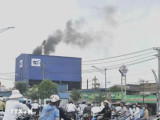The spiral of conflict in the Gaza Strip
The conflict between Israel and Hamas has lasted for a full year with no signs of cooling down, resulting in increasingly severe humanitarian crises. Despite urgent calls from the international community and the efforts of mediators, the prospect of a ceasefire between Israel and Hamas remains bleak. At the same time, tit-for-tat moves continue to raise the threat of a full-scale conflict in the Middle East.
Humanitarian Crisis
A year has passed, but the catastrophic scenes of October 7, 2023, still haunt the people of Israel. Hamas’ bloody attack on Israel resulted in around 1,200 deaths and 250 people being taken hostage. In response, Israel launched military operations targeting Hamas in the narrow strip along the Mediterranean.
According to Gaza’s health authorities, more than 41,800 people have died, and 96,900 have been injured since the conflict began. Speaking to The Guardian, Neama al-Barawi, a Gaza resident, said she was “numb” after losing family members and had no will to do anything when the conflict first broke out.
Over the past year, around 1.9 million people in Gaza, including Neama al-Barawi, have been regularly forced into shelters to avoid bombings.
These tragic numbers may be even higher, as many are still missing or buried under rubble. Thousands of structures in Gaza, including places that should be safe, have also been destroyed by intense airstrikes.
Israel repeatedly claims that it targets only Hamas and accuses the group of deliberately endangering civilians by hiding in schools and hospitals. Regardless of the justification, actions resulting in devastating consequences for civilians are condemned by the international community.
Various efforts to aid Gaza’s people have been implemented throughout the year, such as air-dropping supplies or opening humanitarian corridors. However, these efforts have been insufficient to cover the harsh reality faced by those in Gaza.
Not only do people in Gaza struggle to find shelter, but they also lack access to basic necessities like food, clean water, and medicine.
Border crossings into the Gaza Strip, including Rafah, have been controlled, further pushing those in dire need into a state of extreme hardship, facing starvation and disease.
A report by the UN Office for the Coordination of Humanitarian Affairs (OCHA) revealed that nearly half of aid shipments were blocked or denied to enter the Gaza Strip.
Meanwhile, many aid workers and volunteers have lost their lives while performing their duties, raising alarms about the worsening humanitarian crisis.
The international community has repeatedly called for adherence to international law, including international humanitarian law, and for increased emergency aid to be provided safely without obstructing civilians.
Efforts to ease tensions
Getting Israel and Hamas to the negotiating table has been a key focus of many nations and regional and international organisations over the past year. The most repeated call is to promote a ceasefire.
The UN Security Council passed a resolution calling for an immediate ceasefire in Gaza during the Muslim holy month of Ramadan to lay the groundwork for a sustainable and long-term ceasefire while also demanding that Hamas release those it has captured. Fearing even heavier consequences if the conflict continues, protests calling for a ceasefire have taken place in many countries, including Israel.
In reality, international efforts to ease tensions have not yielded significant results. Israel and Hamas only reached a brief ceasefire agreement at the end of 2023, along with the exchange of some hostages. Although the US, Egypt, and Qatar mediated these talks, many rounds of negotiations on a ceasefire have made little progress.
The deadlock in narrowing the gap between the parties is attributed to the Israeli government’s hardline stance, led by Prime Minister Benjamin Netanyahu, on issues such as control of the Philadelphi corridor, the border area between Egypt and Gaza. Hamas, on the other hand, has insisted on Israel’s complete withdrawal from Gaza, complicating the dialogue.
Some experts believe that achieving a conflict-ending agreement at this time is too ambitious, but a temporary ceasefire could help de-escalate tensions and facilitate humanitarian relief efforts.
While negotiations remain unresolved, the ongoing and expanding conflict fuels the fire in the Middle East. Retaliatory attacks and casualties, not only in Gaza but also in the West Bank and elsewhere, are reported daily in the media.
Fighting between Israel and Hezbollah forces in Lebanon has intensified, particularly after Israel launched airstrikes on southern Beirut and began a ground assault targeting southern Lebanon.
Earlier, Hezbollah accused Israel of being behind the explosion of thousands of pagers and radios used by its members, which resulted in numerous deaths and injuries. Tensions between Israel and Iran have also escalated. Just days ago, Iran launched hundreds of missiles toward Israel in retaliation for the deaths of several key figures from Iran, Hamas, and Hezbollah in earlier Israeli airstrikes.
In support of the Palestinians amid the conflict, Houthi rebels in Yemen have repeatedly launched missiles at Israel and attacked transport routes in the Red Sea.
Ironically, these attacks have not alleviated the suffering of civilians. Retaliatory actions only fuel crises, stoking instability, threatening security, and hindering the region’s development.
As the conflict between Israel and Hamas enters its second year and the Middle East continues to escalate, the international community has expressed deep concern, urging all parties not to be drawn into a “spiral of violence”.
United Nations Secretary-General António Guterres reminded everyone of the civilian losses caused by these conflicts and stressed that violations of international humanitarian law must not be ignored. He called for efforts to prevent further escalation in the Middle East, warning that if neither side backs down, the people of the region will be “pushed into an abyss.”
According to the UN chief, all parties must immediately ceasefire in Gaza, unconditionally release all hostages, provide humanitarian aid to the Palestinians, and work toward an irreversible two-state solution.
NDO
 Indonesian scientist hails Vietnam's ecosystem conservation programme
Indonesian scientist hails Vietnam's ecosystem conservation programme
Thai PM committed to reshaping nation future
 Vietnamese, Indian coast guards conduct joint sea exercise
Vietnamese, Indian coast guards conduct joint sea exercise
 Thailand’s prime minister sets long-term vision for nation
Thailand’s prime minister sets long-term vision for nation
 Indonesian continues to maintain neutral stance: President
Indonesian continues to maintain neutral stance: President
Chinese media praises Vietnam’s economic achievements, outlook
 Opportunities from the “silver economy”
Opportunities from the “silver economy”
 The Philippines ratifies key defence pact with Japan
The Philippines ratifies key defence pact with Japan
Thai police arrest two suspects of festival booming
 US inflation concerns persist
US inflation concerns persist



